Peter MALONE
Saturday, 18 September 2021 19:25
Rain People
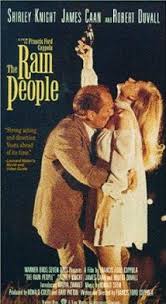
RAIN PEOPLE
US, 1969, 101 minutes, Colour.
Shirley Knight, James Caan, Robert Duvall.
Directed by Francis Ford Coppola.
The Rain People is an interesting film of 1969-70, reflecting the questions of the time and people taking to the road to sort themselves out. The film is also interesting as an early work by Francis Ford Coppola. His commercial career began with a horror film made in Ireland in 1963, called Dementia 13. His first successful film was You're A Big Boy Now which was followed by the musical Finian's Rainbow. The Rain People comes next. He was then to work on the two Godfather films and The Conversation. His film after these achievements was the film of the Vietnam war based on Conrad's novel Heart of Darkness, Apocalypse Now.
It is interesting to look at the film in the retrospect of Coppola's later achievements. James Caan appeared in the Godfather films as did Robert Duvall who also appeared in The Conversation and in an Oscar-nominated role in Apocalypse Now. Shirley Knight is very effective as the heroine passing through the landscapes of the United States. The screenplay is by the director and the music, as in his other films, by his father. The Rain People has been compared with films by such directors as Bob Rafaelson, for instance Five Easy Pieces and The King Of Marvin Gardens.
1. How interesting a film in itself? As representing the attitudes of the late '60s? A particularly American film about American identity? A woman's film -the centre of attention being the female character? The work of the writer director, seen in retrospect?
2. The significance of the title, Killer's explanation of it, reality and unreality, imagery - and the way this was visualised?
3. Colour photography, the atmosphere, the locations? The improvisation of scenes -e.g. the incorporation of the military parade in Chattanooga? The feel for the United States, its range of cities, the countryside, the roads, the people, the weather? The world seen from the car, wandering the roads? Communication by telephone? The phone box communication (and some have suggested it looked like the confessional)? The absence of score, especially at the beginning? The contribution of the music?
4. The effects of the travelling through America? The use of the camera especially for angles e.g. the long phone call sequences? Editing. flashbacks? The use of symbols? The poetic and symbolic atmosphere of the film - enhancing reality?
5. The opening and its mood, Natalie and her waking up, the revelation of her situation, in bed, the husband? Revealing her as a character - and the visual manner of this? Her decision, the drama of her leaving home? The importance of the discussion with her parents as highlighting her character, motivation? The flashbacks to her wedding - with the joy, the ethnic tone, the American style?
6. Natalie's tensions - her taking the car, the Pennsylvania Turnpike? Lack of direction, destination? The picture of the American housewife and her needs, taking to the road?
7. The significance of the phone calls - the three places in which they took place, the long takes and Shirley Knight's skill in communicating herself through the phone call devices? How moving the phone calls - her explaining her emotions, motivations? Hesitant and then able to explain herself and her anguish? Her listening to her husband and his reaction - upset, anger, pleading? The road and her reaction to the traffic? The passing of time, day and night? Fatigue on the road? The flashbacks - especially the wedding? The ethnic background, the implications for sexuality, the inserts - in pink? Natalie and her expressing herself, and her grasp of reality? Her hope? The pregnancy? Her incompetence as a wife, as a parent? Her judging herself in the light of her parents? The phone call from Alabama and her needs? Her steadier phone call from Nebraska and coping with Vinny's anger?
8. The significance of her hesitating to pick up Killer, picking him up? Her motivation, wanting to have a liaison with a man? Her committing herself to him by picking him up? The discussion, his ease, explanation of his name? The decision to go to the motel? Her attitudes of seduction? Comparisons with her husband? Her playing games with him, getting him to take his shirt off, Simon Says? Her humiliating him and his acceptance of this? The effect on her and her being humiliated?
9. James Caan's presence as Killer, his look, way of speaking, the importance of his story as he revealed it, the reason for the name, the flashbacks to his career, sport, violence and injury? The reason for his compliance? His retardation? His being paid to leave the college? His reaction to Simon Says, the sexual situation? A pleasing American man? The flashbacks as seen from his point of view. revealing himself to the audience?
10. Natalie's decision to drive Killer to Virginia - the atmosphere of the drive-in, the meeting with Artie and his promise of the job, Ellen and her violent reaction, her snobbery? The importance of the flashbacks - explaining her fear. her relationship with Killer? The nature of her rudeness, family tensions? Natalie’s reaction and taking Killer away? His submissiveness and disappointment?
11. The atmosphere of the Chattanooga parade, Natalie losing Killer, the phone call and her self-assertion, finding Killer again, a renewed commitment to each other?
12. The transition to Nebraska and its atmosphere, the cowboys, the need to get a job for Killer, Mr. Alfred and his taking Killer on? The chickens, the reptiles? The importance of Killer having the thousand dollars and his telling people, Mr. Alfred and his manoeuvres to get the money? His taking on Killer and Killer's freeing all the animals? The visuals communicating Killer's attitude towards imprisonment? The return of Natalie, getting Killer away, the two hundred dollars? The visual symbolism in this sequence - imprisonment and release?
13. What was happening to Natalie by this time? Her speeding away, the encounter with Gordon? Gordon and doing his job, the interrogation, taking her back to pay the fine, picking her up, showing off with his riding? The encounter with Mr. Alfred and the resolution of Killer's problems?
14. The clash with Killer? Natalie going off with Gordon? Leaving Killer to help himself and wander? The fact that he wandered back? The encounter with Rosalie - the two children and the comparison of Natalie and Gordon looking after these two children? Rosalie thinking that Killer was clever? The irony of her rescuing her father after her being hit, being responsible for Killer's death?
15. Natalie and Gordon - Gordon's story about his wife, his memories, self-punishing, his attitude towards Rosalie? A rather brutal way of life in the caravan? The sexual encounter and Natalie's attitude, Gordon's? Killer trying to rescue her and Natalie being the occasion of his death? Natalie's reaction to Killer's death? To the experience with Gordon?
16. The brief characterisation of Rosalie - shooting, saving her father? The repercussions for Gordon? Natalie and her continuing on the road - and her making up her face, in large close-up, after the attempted sexual liaisons?
17. The finale - the future for Natalie? Her reaction against her way of life and being taken for granted, the American wife, housekeeper? Was she changing? Could she return to her husband?
18. The American road as a microcosm of the country? The types on the road, encountered? Help, selfishness, exploitation? Self-knowledge?
19. How hopeful was the film? The analysis of American character, relationships, love? Natalie and Killer talking about loving 'a little bit'? Vinny and his regard for his wife, Gordon and his regard for Natalie and using her? Ellen and her reaction to Killer? The symbol of childhood and simplicity? Care, harmony? A hopeful film? A reflection of its times?
Published in Movie Reviews
Published in
Movie Reviews
Tagged under
Saturday, 18 September 2021 19:25
Railway Children, The
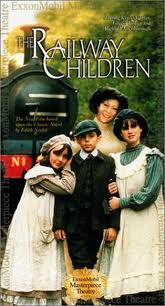
THE RAILWAY CHILDREN
UK, 1970, 108 minutes, Colour.
Dinah Sheridan, Bernard Cribbins, William Mervyn, lain Cuthbertson, Jenny Agutter, Sally Thomsett.
Directed by Lionel Jeffries.
The Railway Children is a classic family film. It was the first film directed by Lionel Jeffries who then went on to make The Amazing Mr. Blunden and the excellent film about a child and his problems, Baxter. The story is a classic from the turn of the century and concerns the ups and downs of an impoverished family. It is set near a railway line and the atmosphere of railways. Dinah Sheridan is charming as the children's mother. Jenny Agutter, who was to develop into a prominent English star, is the eldest of the children. There are many character actors in engaging performances in minor roles. The English country side looks beautiful. And there are many entertainment and message values in this film for the whole family.
1. What was your overall impression of this film? Was it a satisfying film? A humane and warm film?
2. The narrative technique from Bobby's part add to the interest of the film? Did it move along? And did the ending draw all this together and give it a happy ending (with the cast waving at the audience saying goodbye)? A children's film? How did it appeal to adults as well? Why did it appeal to children?
3. Comment on the period re-creation of the film, The presentation of London at the turn of the century, The houses, the furnishings, the costumes, the style of life and manners, The re-creation of the Yorkshire setting, the countryside, the town the houses and style, The re-creation of the railway, the trains and the railway life.
4. How did the film draw its audience to identify with the Waterburys? Why were they a likeable family? Because of the parents? The children?
5. How interestingly was their London life presented? The comfort and the gentility? The relationship between the parents and the children amongst themselves? (Their pranks with the maid?)
6. What impact did the father have in the family? His support of the family? His love? Their reliance on him. especially Robby's? The close relationship of husband and wife?
7. How important was the influence of the father when it was revealed that he was in prison? Should the mother have told the children the truth? How was his absence made felt in the film? The change in their style of life? Their growing poverty? The disregard of the babe and the leaving of the servants? Poverty as a reality?
8. How strong was the film on the theme of how people can make the best of their poverty? Was this illustrated in their leaving their home in London? The journey to Yorkshire? Their arrival there? (And the humour of the driver?) Their finding their new home and settling in? How did this endear them to the audience? And get the audience involved in their plight?
9. Comment on the film's theme of kindness. The fact that people were kind to the family coming from London. The kindly gentleman in the train and his response to the children? The Russian and the family's looking after him? Jim and his reaction on the family?
10. What effect did the change to Yorkshire have on the family? How did it make them all better people? How badly did they feel the absence of the father? How was this especially strong for Bobby?
11. How impressive was Mrs Waterbury as a person? How was this communicated in the film? By Dinah Sheridan's dignity? By her charm? By the sequences with the children? Her looking after them? The writing of stories? Her illness? Her following through with the children's plans?
12. How sympathetic a heroine was Bobby? Why? Her strength? Relationship with the other children? Her leadership? Her support of her mother?
13. How attractive a girl was Phyllis? Her playfulness? Why would the audience have liked her?
14. How sympathetic a boy was Peter? How attractive? Why did audiences like him?
15. The importance of Mr. Perks in the film? As a humorous character? As illustrating the railway life at work? (Where was this shown best?) His kindness towards him? The fact of his birthday and their efforts for his birthday? Why was he so sensitive and the birthday almost not a success? Why did he back down in his pride? The influence of his wife?
16. The old gentleman: how endearing a character was he? His waving to the children and their relationship with him? His help when they saved the train? His help as regards their father?
17. How did the film use various incidents and adventures to communicate the atmosphere of the place and the quality of the characters? For example, the collection for Mr. Perks' birthday, the incident of the saving of the train, the awarding of the medal for the children, Jim and the cross country run, saving Jim and looking after him, the Russian and his background?
18. What was the impact on Bobby when she learnt the truth about her father? Should she have known this before? Her initiative in getting the old gentleman to help her? (The techniques that the children had for communicating with him, his getting on the train etc.) Was the resolution plausible?
19. How optimistic a film was this? How strong a belief in human nature?
20. What values did it represent? How strong a warmth in human values did the film have? How valuable an experience for children was this film?
Published in Movie Reviews
Published in
Movie Reviews
Tagged under
Saturday, 18 September 2021 19:25
Raiders of the Lost Ark
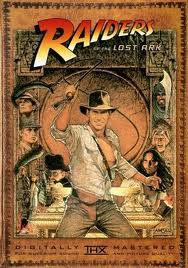
RAIDERS OF THE LOST ARK
US, 1981, 115 minutes, Colour.
Harrison Ford, Karen Allen, Paul Freeman, John Rhys Davies, Denholm Elliot, Ronald Lacey, Anthony Higgins, Alfred Molina.
Directed by Steven Spielberg.
Raiders of the Lost Ark hits the jackpot. George Lucas proves again that audiences love a good yarn, the far-fetched adventures of upright heroes, strong heroines, snarling, sadistic villains and cliff-hanging climaxes. They come thick and fast here, blending real suspense (snakes, boulders) with hilarity. Hitler is after the Ark of the Covenant in the mid-'30s but hero, Indiana Jones (played by Star Wars' Han Solo - Harrison Ford) prevents him in a replay of serial cliches, presented good-humouredly but straight, that is both hugely entertaining and a nostalgic tribute. Karen Allen is an attractively sturdy heroine. Steven Spielberg keeps it going at a rattling pace - almost defying anyone not to enjoy it.
1 George Lucas' insight in the '70s that audiences enjoyed the serials of the past, myths and legends, heroes and adventure? His success with the Star Wars films and with this kind of film? Audience response justifying his insight?
2. The place of the serials in the '30s and '40s? Their continuation in TV serials and series? The films as pop-art and popular art? The stereotype characters? The basic situations? Danger, climaxes? The importance of the far-fetched nature of the adventure and its being larger than life? Symbols of quests - for the matinee audience? A good and enjoyable yarn? Serving as popular images and symbols of the times? Their reflecting the interests especially in exploration, science and technology? Their frequent use as propaganda e.g. anti-Nazi or anti-Japanese for World War II?
3. This film as a tribute to the serials and their impact and style? Parody as well as tribute? A satisfying blend of the serious and the hilarious? The various devices to draw the audience in? Fast-paced adventure, dangers for audiences squirming in their seats, sudden laughter and applause? Trick photography, special effects?
4. The colour photography, Panavision? Locations? The prologue and its setting of a mood? The explanation of the quest for the Ark of the Covenant? The device for the plane journey across the map of the world? The background of archaeology and audience interest in excavations in Egypt - with echoes of curses? Adventure on water - ships and submarines? The Guns of Navarone-type anti-Nazi adventure with caves and hidden arms? The special effects at the end with the Ark of the Covenant - and the popularity of the occult films of the '70s? The quality of the special effects? Stunt work? The essence of cinema?
5. The prologue and its tone, adventure in an exotic jungle, the quest for a religious statue, religious and superstitious overtones, the intrepid American adventurer in South America, the natives and the primitive background? The dangers - spiders, concealed weapons, trick floors, caverns, boulders? The ingenuity of Indiana Jones in eluding all the difficulties and overcoming dangers? The betrayal by his assistant? Belloc as the international villain? The massacre, the chase, the irony of the pilot fishing? The take-off with the post-script humour about the snake in the cockpit?
6. Indiana Jones as American hero? Harrison Ford's background from Star Wars? The Clark Kent quiet bespectacled lecturer? The adoring students - with 'love you' on their eyelids and the young man with an apple for the teacher? The professor and the discussions about archaeological missions? The American government and the serious s discussion about the Ark of the Covenant? The prospect of Hitler wanting the Jewish Ark for communication with God for world power? The atmosphere of the '30s, Nazism, international arms build-up? The American hero to confront this
?
7. The humorous journey in the plane (complete with Gestapo agent and hat)? The stop in Nepal - the introduction to Marion, her out-drinking the locals? The confrontation by the Nazis? The fight? The imprint of the medallion on the Nazi's hand? The humour with his coat-hanger? The clash between
Marion and Indiana and their making up?
8. The continued journey and arrival in Cairo? Getting the information from their friend? The focus on fights in the street - cars, the monkey, poisonings, the Arab with the scimitar and his being shot (to the applause of the audience!)? Marion in the baskets and the truck exploding?
9. The sequences on the diggings? Belloc and his maps, trying to find the Ark? German soldiers with the Nazi overtones? Indiana and his acquiring the means to find the place where the Ark was? His getting in to test with the sun's rays? The atmosphere of spying on the excavations? The discovery of the cavern? The snakes and the overcoming of the snakes -with audiences squirming with eyeball to eyeball snake confrontation? Marion falling in with the snakes? The Germans discovering them and putting the stone over the exit? The elaborate escape via the statue - plus Marion surrounded by the skeletons?
10. Marion and her escape from the explosion? The encounter with Belloc and trying to outdrink him to escape? The run to the plane and her machine-gunning the vehicles? Trapped in the cockpit? The petrol and the explosions? Indiana fighting the giant man? Their escape?
11. The adventure and humour of the truck pursuit? Indiana' single-handedly getting rid of every truck and car? His being wounded, on the front of the truck, under the truck, behind the truck, back on the truck?
12. The escape from Egypt? The captain of the ship? The tranquillity of the ship - with the mirror cracking Indiana's jaw? The submarine and the capture of Marion and the Ark? Indiana's eluding detection and getting onto the submarine?
13. The build-up to the climax in the caves? The atmosphere of The Guns of Navarone? Indiana disguised as a German, trapping the group going into the desert? His being persuaded to give up?
14. The build-up to the climax - hero and heroine tied to a post, keeping their eyes shut and surviving? Indications of power from the Ark - burning on the ship? The taste and irony of the Jewish Ark in a box with swastikas? The release of power? The special effects for the power, the contorting of the faces of the Germans and of Belloc? The explosions and their disappearance? A fitting climax for the adventures?
15. The happy ending, the prospect of the power of the Ark.. U.S. supremacy? Hiding the Ark - and the huge number of crates?
16. The intentions of the film to entertain, tell a good story? Success? Adventure and humour? An appeal to all ages? The power of the cinema to get audiences involved and keep them involved - and satisfyingly entertained?
Published in Movie Reviews
Published in
Movie Reviews
Tagged under
Saturday, 18 September 2021 19:25
Raid, The
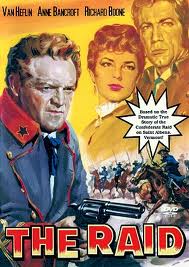
THE RAID
US, 1954, 83 minutes, Colour.
Van Heflin, Anne Bancroft, Richard Boone, Lee Marvin, Tommy Rettig.
Directed by Hugo Fregonese.
The Raid is a small budget western made in the mid-50s. It has stood the test of time quite well and is still impressive in its small way today. It is a different slant on the Civil War and shows a town near the Canadian border and the infiltration by spies from the south. The film focuses on a small family, a widow and child and the leader of the southern spies. This leads to a war confrontation and emotional conflict, all particularly well handled. Van Heflin is his usual strong self in this film. It is interesting to see Anne Bancroft in one of her earliest roles. Child star Tommy Rettig, who was most popular at the time, completes the main stars. The Raid is an
enjoyable small western and has values for the whole family.
1. What impact did this film have? How enjoyable, how interesting? As a war film, as a western? What did the film do to audience sympathies?
2. As a war film: the realities of war, revenge and retaliation, undefended towns and innocent people, relieving the pressures of armies etc.? Where were audience sympathies drawn? Questions of loyalty, right and wrong?
3. Comment on how the plans were communicated to the audience? The issues of destruction and retaliation? Audience judgment on these issues?
4. How well-conceived was the plan? The details of its execution? The risks for people, the soldiers involved, the emotional repercussions, personal involvement, suspense?
5. The film's focus on Benton: what kind of man, character, leader, the leadership in prison, leaving the dying soldier, the details of his plan, ingratiating himself in the town, earning respect, love, business skill, shooting his own man, the reality of his being a double-agent - especially when discovered by Larry? Audience sympathies and reaction via Kathy and Larry?
6. The complex sequence in the church: the atmosphere of the service, the irony of the sermon, the people present. Benton's worrying about Keating, Keating's praying, his reaction to the sermon, the shooting. the congratulations of the townspeople? How did this sequence focus the issues of the film?
7. The impact of the raid itself and its violence? The tactics and their justification? The amount of destruction?
8. The contribution to the plot and its complexities of Keating and his aggressiveness, his going mad and his death? The subordinate soldiers? Captain Foster and his role at the house, the truth about his cowardice, his heroism in the shooting, his death? The townspeople and their support of Benton?
9. What is the value of presenting such a complex film for popular audiences? The American heritage and the Civil War?
Published in Movie Reviews
Published in
Movie Reviews
Tagged under
Saturday, 18 September 2021 19:25
Raging Bull
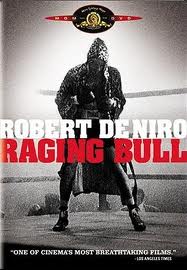
RAGING BULL
US, 1980, 128 minutes, Black and white.
Robert de Niro, Joe Pesci, Cathy Moriarty, Theresa Saldana.
Directed by Martin Scorsese.
Raging Bull is a hard film. Boxer Jake La Motta rages and bashes his way to championship, his Italian-New? York chauvinism makes him turn on wife, brother as well as enemy. His defeat and bloated retirement are hard for him. Fight
scenes are unrelentingly brutal and so are the arguments, the shouting and the hostility of the characters. It is a film to admire rather than enjoy; the characters are presented as less than sympathetic, there is no romanticising of La Motta, played with great power and insight by Robert de Niro. Director Martin Scorsese, no stranger to observing ugly city life, where words like grit, guts, gore are apt, makes a very strong film. Scorsese and de Niro worked together on Mean Streets, Taxi Driver, New York, New York.
1. The acclaim the film received, awards and nominations? Well merited?
2. The use of basic black and white photography, technicolour prints? The colour of the initial credit? The insertion of the home movies in colour? The point of this contrast? The professional world of black and white? The more tender moments, in colour? The quality of the black and white Photography? Light and shadow, over-exposure? Patterns? Close-ups? The dramatisation of the fight sequences? The insertion of slow motion sequences? The importance of the sounds? Shouts, underlying music, the sounds of the breathing and roar of a bull? The importance of the technical aspects for overall response?
3. The range of music used: the popular songs of the time, the Italian songs? The operatic background from Cavaliera Rusticana? The human sounds? Cacophony? An atmosphere of noise?
4. The tradition of boxing films? The grimy exposures, the individual against corruption, the Rocky-type heroics? How did this film fit into this tradition? Counterbalance it? The sombre tone of this film - contrivances, realism, authenticity?
5. The presentation of the world of boxing: boxing skills, strength, brute strength and force, training, competitiveness, the domination of winning, the effect on the fighters both psychologically and physically, on the crowds and their applause, disappointments? The people working in the boxing profession, announcers and referees, the Mafia background in America, people going on the take? The physical violence, bashing, gore, blood spurting? How well did the film present the realities of the boxing world?
6. The anti-boxing tone: the hardness of the boxing world, the physical injury and damage, brutality, man becoming animal - raging bull? Vengeance? Corruption? The aftermath and retirement? People punch-drunk, living on their memories?
7. The achievement in the boxing world: the push and drive, training, total absorption, the hard work, championships, the various bouts, press reporters, publicity, acclaim?
8. The framework of the screenplay: the rehearsal for the cabaret with Jake as fat, mouthing his lines? An indication throughout the rest of the film of what was to come? Audience judgment of him at the various phases of his life? The emphasis on places, dates? The authenticity of these fights? The times? The glimpses of each fight? Jake changing in his personality over the decades? The cumulative effect of family life, the fights? A portrait of a boxer? A sketch? Allowing the audience to fill in what was merely suggested? How rounded a portrait?
9. Audience judgment finally on Jake la Motta: seeing him in his cabaret rehearsal and then his cabaret act at the end? Seeing him as a young tough man, the raging bull, his victories, his never going down? Family relationships? The interchange with Joey, brotherly love? Joey and his managing
him? The trainer, the various members of the team? His being carried along by success? The Italian-New? York background, his attitude towards his wife, shouting, suspicions? Italian chauvinism? His leaving his wife? The ever boiling potential for eruption and clash? His seeing Vicki, flirting with her, the relationship, the proposal and marriage? The long initial scene at the pool, at the nightclub? How well did he love Vicki? His growing suspicion of her, his watching her e.g. at the nightclubs? His interrogations? His attitude towards the Mafia - his spurning of the second men, the relationship with Tommy? His suspicions of Joey in league with Tommy? His finally agreeing to a set-up?
10. Jake la Motta as a championship boxer? His strength, the various fights and contenders, fights with Sugar Ray Robinson? His continued victories and there being few contenders? The bashing of the boxer with the 'pretty face'? The beginning of Jake's decline? Joey and his trying to manage him, Tommy and the Mafia influence? Jake's potential for trouble?
11. How attractive a character was Vicki? The young girl at the pool and her sultry looks (the Lana Turner style of the '40s)? The nightclub sequence? The insertion of the colour sequence with the home movie style? The relationship, marriage? The detail of her life with Jake, her love for him, the growing family? The build-up of suspicions? Her outing and Joey's causing trouble in the nightclub? Her travelling round with Jake and his accusations and interrogations? The build-up to their fights? His chasing her through the streets, the climax at Joey's home? Her staying with him in his retirement? His praise of her in his cabaret act? Her decision to leave - his visit to get the money for the bail and his championship belt? Her walking out of his life? How sensitive and accurate a portrait of Vicki?
12. The portrait of Joey: family relationship, brotherly love, mutual sparring? His support? His keeping an eye on Vicki? His own marriage, family? His hardness on his wife? His double standards in Italian masculine behaviour? His interrelationships with the Mafia, his helping Vicki after the nightclub incident? His bashing the arm in the taxi door? Vicki and her going to Joey's place? Jake and his physical and brutal clash with his brother? Joey's being hurt? Vicki's persuading him to ring and reconcile, his inability to speak? The final reconciliation - Jake's effusiveness, Joey's suspicions? How successful a portrait?
13. The culmination of marriage with Jake? Vicki and her patience, her interest in his nightclub, her telling him about leaving? The final sequence and discussion in the home in Florida?
14. Jake and his decline? His not falling even when on the take, his suspension? His being bashed by Robinson and refusing to fall? The culmination of his boxing career?
15. The transition to the Hdd-'50s, his own nightclub, his friendliness with the visitors, his gauche manner, the Lenny Bruce style cabaret talk? The incident with the young girls and their being under age? The jail sequence - his arrest, pawning his belt, the degradation of being in jail? The low ebb of his career?
16. Building himself up to being a cabaret entertainer in New York? His attempts to reconcile with Joey? His increase in weight and grossness? The mellowing of his humour? The quotations of the various authors for his cabaret act, the advertisement? His final recitation to the mirror?
17. How telling a portrait of a man, strengths and weaknesses, good and evil? Insight into human nature. career, sport.. money, family, fame? An example of a vision of man's living in America in the 20th. century? How particular the insight. how universal?
Published in Movie Reviews
Published in
Movie Reviews
Tagged under
Saturday, 18 September 2021 19:25
Raggedy Man
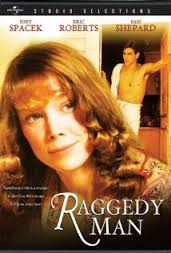
RAGGEDY MAN
US, 1981, 94 minutes, Colour.
Sissy Spacek, Eric Roberts, Sam Shepard, Henry Thomas.
Directed by Jack Fisk.
Raggedy Man is a pleasing modest drama about a divorced woman and her children during World War Two in a small Texas town. The film, written by William Wittliff (Barbarossa and other westerns) has the western theme of the woman with her children needing the support of the passing stranger in confronting the town. The film is an interesting variation, making a 20th. century western.
Sissy Spacek is effective in the central role and has good support from the children. (Henry Thomas, who plays the older boy, was chosen for E.T. on the basis of his performance here.) Eric Roberts (stage actor, King of the Gypsies) is the passing sailor and playwright-actor Sam Shepard (Frances, Days of Heaven) has a small but effective role as the raggedy man. The film has sentiment, human drama, humour, violence and a Gothic confrontation when the raggedy man attacks the would-be rapists and saves his wife and children. Direction is by Jack Fisk, Sissy Spacek's husband. A modest and entertaining film.
1. An entertaining film? A picture of American society, nostalgia for the past, memories of World War Two gears? Family, the small town, relationships, violence? A satisfying piece of Americana?
2. The picture of Texas, the small towns, the life in the town? The special effects for the raggedy man and the final confrontation? Musical score, moody and melodramatic aspects of the score? The use of Andrews Sisters and Benny Goodman songs?
3. The focus of the title? The mystery of the raggedy man and his scarecrow look? His being real, symbolic? The protector? The man atoning for his wrongs? The victim of World War Two? The prologue and the glimpse of the husband, the dance, his dancing with other women - and the reaction of Nita? His disappearance? The raggedy man wandering the town, shambling along the road? The sheriff explaining his presence in the town and his war-wounding? The audience glimpsing his face? His saving Nita from the rapists by blowing the horn? The final attack and his killing the assailants, his own death? His proving his love for the family he had wronged?
4. The prologue and the establishing of the situation between Nita and her husband, the children? Texas and the '40s? Nita at home, watching her husband, the separation and divorce? The Texas location, remoteness, the country town, the pressures of the war?
5. Nita and her work for the phone company? Her status as a divorcee and public opinion? Her working at home, the continually ringing telephone? Her relationship with the boys and their playing in the yard? Bumping into Rigby? Their love for their mother, her care for them? Her fright when they were attacked by the men? Her severity to protect them and their reaction against her? The phone ringing and its presence in the house? Her having to cope, her wanting to move, appeal to Rigby, hopes? The chance meeting with Teddy and his- phone call, her hearing the message, inviting him to coffee, letting him stay? Giving rise to gossip (and actually justifying the gossip)? Enjoying his day of playing with the children, the outing to Corpus Christi, the return and the present, her cleaning the house, getting the special dress, the sequence where she sang 'Rum and Coca Cola'? The evening with Teddy, the night with him? His indiscretion the next day? The bashing and her wanting him to leave? Her anger with the children? His farewell? The decision to confront Rigby, buy the bus ticket, take the children away after their reaction against her (though her love for them, seeing them in bed later that evening)?
6. Rigby and the phone company, his saying she was frozen in the town, his lies? The shops and the men teasing the boys? The two men and their lusting after Nita, prying on her, looking through the window? Being warned off by the raggedy man? The sheriff's visit and his comments on her? The shops, the bar and the attack on the boys, the proprietor pulling his rifle? The gossips and the ladies of the town? Corpus Christi and the picture show, the fairground?
7. Nita and her fears alone in the house, the sheriff not being helpful? Her tension, the attack and the melodramatic pursuing of her around the house, Harry locked in the toilet? Her fear, her pleas to the assailants? The impact of the raggedy man and his killing the attackers? The understated comments in the bus about the identity of the raggedy man and his love for his wife and children?
8. Teddy as the ordinary young sailor, the comments made by the visitor paying his bill, about warfare and being involved? The phone call and his disappointment? Staying, the cup of coffee, sleeping the night on the porch, playing with the children and their enjoying it, talking with Nita, the outing to Corpus Christi? The night together? The fight in the bar and his protecting the children? His being urged to leave - and his story about the two shoes with the boys' names? The point of the John Wayne film and the heroism and his admiration of it? Nita and the boys hoping to meet him again?
9. The sketch of the children - their relationship with each other, the older boy rather quiet and protective, the younger boy assertive? Banging into Rigby, playing around the house? Enjoying the company of Teddy? Calling him 'Dad'? Their anger against their mother at the meal? The need for a father's love? Their supporting their mother at the end? Their future together?
10. The crisis, Nita's giving notice to Rigby and his having to man the phone by himself, buying the bus ticket, the fright in the night, the moving away to a new future?
11. The film as a piece of entertaining Americana? The small town, the isolation, victimisation? Marriage, love and disappointments? The portrait of a woman as wife, alone, mother? The point of the film as a reminiscence of 40 years earlier?
Published in Movie Reviews
Published in
Movie Reviews
Tagged under
Saturday, 18 September 2021 19:25
Rage of Paris, The
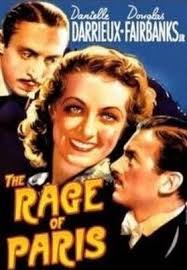
THE RAGE OF PARIS
US, 1938, 78 minutes, Black and white.
Danielle Darrieux, Douglas Fairbanks Jnr., Louis Hayward, Mischa Auer, Helen Broderick, Harry Davenport, Samuel S. Hinds, Mary Martin.
Directed by Henry Koster.
The Rage of Paris is a piece of late '30s screwball frivolity. It is reminiscent of so many films of the time, produced by Universal Studios. It was directed by, Henry Koster (who directed many Deanna Durbin vehicles at this time).
The film is a star vehicle for the French star Danielle Darrieux. However, very young, she creates no more impression than any other of the rising stars at the time. However, she was to go on to a very distinguished career, especially in France. Douglas Fairbanks Jnr. and Louis Hayward are adept at this kind of film, as is Mischa Auer. A film of its period.
1. Romantic and screwball comedy of the '30s? In its time? Now?
2. Universal Studios production, black and white photography, New York settings? Musical score? The countryside?
3. The title, the focus on Nicole, the response of the men, the double-crosses, the exposes, the happy endings?
4. Danielle Darrieux as Nicole: wanting the job, the modelling, wearing the drapes, taking the wrong address, meeting Jim, the comedy of the photography and his reaction? Her hurrying away, with Mike and Gloria, Her meeting Bill's parents, the farce of the possible expose, her tactics, her deceits? Being kidnapped by Jim, in the country, in love with him? Her return to the city, Bill thinking he was rid of her, Jim taking over and marrying?
5. Jim and Bill, friends, wealthy, New York society, in love, engagement, Bill and his innocence, Jim and his efforts to expose Nicole, taking her away, in the countryside, in love?
6. Gloria and Mike, their friendship, the hotel, the aim of the restaurant. the setting up of Nicole, engineering the deceits? Gloria and her friend ship? Mike and his continued reappearance, trying to prevent Jim from telling the truth? His deal with Bill? Shrewd resolution?
7. The picture of New York society in the '30s, the Duncans? Restaurants, fashions, companies, advertising campaigns?
8. Screwball comedy, romantic comedy? '30s style?
Published in Movie Reviews
Published in
Movie Reviews
Tagged under
Saturday, 18 September 2021 19:25
Rage in Heaven
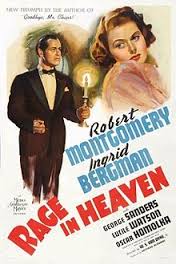
RAGE IN HEAVEN
US, 1941, 82 Minutes, Black and White.
Ingrid Bergman, Robert Montgomery, George Sanders, Lucile Watson.
Directed by W.S. Van Dyke II.
Rage in Heaven was Ingrid Bergman's third American film, made at the same time as Adam Had Four Sons and Dr. Jekyll and Mr. Hyde. She indicates the kind of presence she was to have over many decades in films winning Oscars for Gaslight, Anastasia, Murder on the Orient Express.
The film was directed by W.S. van Dyke, noted for his competent making of films in economic time and budget. The film is a typical romantic melodrama of the 40s. Robert Montgomery, repeating the style of psychopath from Night Must Fall, is well contrasted with George Sanders in a suave sympathetic role. There is a strong supporting cast. The original novel was by James Hilton, author of Lost Horizon and Goodbye Mr. Chips. Writer Christopher Isherwood was one of the screenplay writers. Rage in Heaven is an interesting glimpse of the attitudes towards psychiatry around 1940. It might be compared with Lady in the Dark, the musical presentation of psychiatry also made in the early 40s.
1. An interesting, enjoyable popular melodrama of the 40s? The stars and their impact? MGM glossy style of the times?
2. The significance of the title, the reference to Milton and hate and love? Indication of tone and themes?
3. The presentation of madness, the role of psychiatry in the 40s, now? How much insight into the psychopath, ways of behaviour, effect on others' lives? Madness and melodrama? Robert Montgomery as Philip Morell? The fact that he was first seen and was identified wrongly as Ward? His sanity, insanity? His charm and yet his icy hostility? Seeing him with Ward, at home? His relationship with his mother, memory of his father? The inheritance, his wealth, work and industry? His reluctance to be involved in the work? The encounter with Stella, the quality of his love - would it have been possible
4. The presentation of his mother, her love for her son, love for Stella? The importance of her moving to South Africa? Her presence at the end, hostility towards Stella and Ward? The influence on her dead son and the revelation about the diaries? The Freudian overtones of mother-son relationship, the revelation of the father's suicide and Philip following the pattern?
5. The presentation of Stella, Ingrid Bergman's presence and style? Her charm, her presence with Mrs. Morell, her vivacity and attraction towards Philip and Ward? The genuineness of her love for Philip, the quality of the marriage? The suspicions, fears? Ward's presence and her acting properly? The background of the lyrical scenes with Ward before her marriage to Philip? The various pressures and their effect, the outings with ward and Philip's sudden presence, the scene in the confrontation with the workers? Her decision to leave him and the pressure on Philip to make her victim as well as Ward? Her pursuing the case through and the gratification of discovering the truth? A portrait of a heroine?
6. George Sanders' style as Ward? Charm, Philip’s continued jealousy even from childhood and university days? His presence, skills, hopes? The romantic scenes with Stella before the marriage? His discretion after their marriage? His presence in the home, his ordinary behaviour with Stella eg. the meal? Philip's attempt to kill him? His being totally victimized and set up and his walking into the traps with the room, the knife in the handle, the car etc.? The prison scene? His vindication?
7. The presence of the servants, especially Clark and his loyalty to Stella? Their role in the melodrama?
8. Audience interest in and response to Philip's plan, the detail of his execution, the discovery of his motives?
9. The presentation of the trial, the inevitability of Ward's condemnation, the prison sequence, the prison governor and the chaplain and helping Stella to see him?
10. The framework of Dr. Rameau? The importance of the scenes at the beginning, Philip’s escape and Dr. Rameau's interest in psychiatry? The melodrama of his presence at the end and his vindicating the situation? The desperation of discovering the diaries and the 'phone calls from Paris?
11. The commonplace happy ending, appropriate for this kind of romantic film? Values of right and wrong, sanity and madness, justice? A melodramatic blend of romance and danger?
Published in Movie Reviews
Published in
Movie Reviews
Tagged under
Saturday, 18 September 2021 19:25
Racket, The

THE RACKET
US, 1951, 90 minutes, Black and white.
Robert Mitchum, Robert Ryan, Lizabeth Scott, Ray Collins.
Directed by John Cromwell.
The Racket is a 1950's style treatment of the Syndicate, Mafia situations (like such Humphrey Bogart films of the same time, The Enforcer, Deadline U.S.A.). It is tough and straight in its treatment. In the 30's, the gangsters could be taken as somewhat glamorous villains. Moralising statements were added in to remind the public of their disastrous effects in the cities (e.g. Scarface and Little Caesar).
In the 1950's, the gangsters are in no way glorious but rather disgusting in their resorts to violence (although many bosses consider this as a thing of the past) and in the graft, corruption and manipulation of power. The moralising comes at the end from the mouth of the central character. Robert Mitchum shows the American image of the good, tough cop. Robert Ryan is adequate as the old-style sadistic gangster. The film is sufficiently well-paced. Its story and many features are familiar to us now. But it is an interesting document from a U.S. of the past - which in many ways is still the same.
1. This film was made in 1951 and shows preoccupations of the times as well as the syndicate, crime and fashion styles of the times. How different is the American racket and corruption scene from the 1920's and the 1970's?
2. How does a film like this affect your attitudes to politicians, the syndicate bosses who run cities, and to the police?
3. Is this kind of set-up a peculiarly American thing or is it just that the Americans show us themselves more frequently than others?
4. How had Nick Scanlon arrived as boss of the city? How much violence had he used? How important was violence to him?
5. Why did the bosses think violence was an outmoded technique and to be avoided? what did they use in its place? Was it more effective? Was it more effective because it was more respectable?
6. Why was McQuigg? a good policeman? Could you fault him in any way?
7. Did Johnson do a good job? Could you fault him at all?
8. How did the bosses keep their hold over lawyers, judges and police? How is it possible to combat such ruthless power syndicates? How effective are honesty and courage?
9. The film ended with a morale-boosting little sermon. How effective are films like this, in forming in public attitudes a disgust for such corruption and vice?
Published in Movie Reviews
Published in
Movie Reviews
Tagged under
Saturday, 18 September 2021 19:25
Racing With the Moon
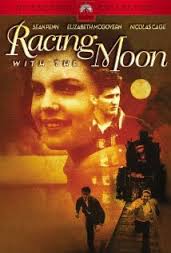
RACING WITH THE MOON
US, 1984, 108 minutes, Colour.
Sean Penn, Nicolas Cage, Elizabeth McGovern?, Crispin Glover, Michael Madsen, Dana Carvy, Carol Kane.
Directed by Richard Benjamin.
Racing With The Moon in synopsis sounds like 101 other films. The difference lies in the sensitivity of treatment by director, former comedian, Richard Benjamin (My Favorite Year, City Heat). Two teenagers in a small Californian town, 1942743, wait to go into the Marines. The usual situations and problems arise: school, home, jobs, relationships, selfishness, hurt, the draft. The film also focuses on an abortion and its emotional consequences. Sean Penn (Bad Boys, Fast Times, Falcon and the Snowman) and Elizabeth McGovern? (Ragtime, Lovesick, Once Upon a Time in America) and Nicolas Cage (The Cotton Club, Birdy) are sympathetic in the central roles. While the film has an aura of nostalgia and the romantic, human nature, strengths and weaknesses have not changed over the decades and the film offers enjoyment as well as food for reflection by both teenagers and parents.
1. An enjoyable and entertaining film? Dramatic impact? Emotional? A humane film?
2. The re-creation of the '40s? California? The town and its detail, the war and the allusions? Editing - both quiet and pace? The tour de force of the pool game and its aftermath? The musical score and its range? Songs of the period, classical music?
3. A portrait of the '30s and '40s? America of the '30s, the end of an era? The impact of World War Two? American values, crises? The teenagers who were to be the post-war generation?
4. The opening with the train tracks, Henry, the use of the trains throughout the film, racing the trains, jumping onto them and off, day and night, the ending and the chasing of the train?
5. The portrait of Henry? Walking along the train tracks and first impressions? The kids and the coins on the train lines? (His and Nick's past imaged by the bogs?), His mother and her expectations, the piano lesson and the classics, changing to boogie-woogie and the reaction of his teacher? Going out, encountering his father, the dog? Nick and the bowling alley? Friendship with Nick? The work at the bowls? The fight with the rich teenagers? The bonds between Nick and Henry? His relationship, with his father and mother - his father's friendship and sympathy, the cemetery, the talk. his father telling Nick's story to him? The date - and the encounter with Annie? The visit to Nick's girlfriend's home? Meeting Caddie at the cinema, giving her the flower. pretending to serve in the shop and giving her the pie, following her home? His presumption that she was rich? The theatre, the war, the newsreels of the war? The date? The rehearsals? Caddie and the roller-skating sequence - and his showing off, saving himself? Their sharing their special places, his playing the piano for her, the story of the treasure hunt, the pond, the nude swim, the sexual encounter? Similarities to Nick, differences? In his treatment of Caddie? Sharing experiences - looking at the shoes in the shop? The rehearsal for the invasion and his turning on the dance record? The visit to the library, the faux pas with the book that he chose, Caddie taking him to the hospital, the encounter with the man who had lost his limb? His anger with Caddie? The build-up to the birthday party, his need for money, the question of the abortion. the clash with Nick, the clash with Caddie? The game of pool - and its failure and their escape? The importance of the funeral, the reconciliation, the map for the treasure hunt and the
11. The comedy of the pool sequence? The build up, the reversal of the con? the humour of the escape? Pace and timing?
12. The importance of the natural beauty of the environment: the landscape, the sea, the moon and clouds, the picture of a far away, beautiful world?
Published in Movie Reviews
Published in
Movie Reviews
Tagged under